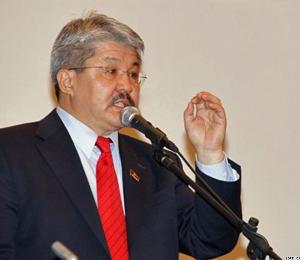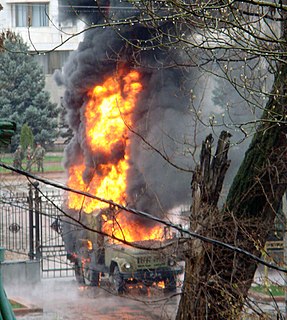Related Research Articles

The history of the Kyrgyz people and the land now called Kyrgyzstan goes back more than 3,000 years. Although geographically isolated by its mountainous location, it had an important role as part of the historical Silk Road trade route. In between periods of self-government it was ruled by Göktürks, the Uyghur Empire, and the Khitan people, before being conquered by the Mongols in the 13th century; subsequently it regained independence but was invaded by Kalmyks, Manchus and Uzbeks. In 1876 it became part of the Russian Empire, remaining in the USSR as the Kirghiz Soviet Socialist Republic after the Russian Revolution. Following Mikhael Gorbachev's democratic reforms in the USSR, in 1990 pro-independence candidate Askar Akayev was elected president of the SSR. On 31 August 1991, Kyrgyzstan declared independence from Moscow, and a democratic government was subsequently established.

The Politics of Kyrgyzstan, officially known as the Kyrgyz Republic takes place in the framework of a parliamentary representative democratic republic, whereby the President is head of state and the Prime Minister of Kyrgyzstan is head of government. Executive power is exercised by the government. Legislative power is vested in both the government and parliament. The Economist Intelligence Unit rated Kyrgyzstan a "hybrid regime" in 2019.

Kyrgyzstan, officially the Kyrgyz Republic, also known as Kirghizia, is a landlocked country in Central Asia. It is bordered by Kazakhstan, Uzbekistan, Tajikistan, and China. Its capital and largest city is Bishkek.
The Tulip Revolution or First Kyrgyz Revolution led to President of Kyrgyzstan Askar Akayev's fall from power. The revolution began after parliamentary elections on February 27 and March 13, 2005. The revolutionaries alleged corruption and authoritarianism by Akayev, his family and supporters. Akayev fled to Kazakhstan and then to Russia. On April 4, 2005, at the Kyrgyz embassy in Moscow, Akayev signed his resignation statement in the presence of a Kyrgyz parliamentary delegation. The resignation was ratified by the Kyrgyz interim parliament on April 11, 2005.

Roza Isakovna Otunbayeva is a Kyrgyz diplomat and politician who served as the President of Kyrgyzstan from 7 April 2010 until 1 December 2011, becoming the first female Central Asian Head of State. She was sworn in on July 3, 2010, after acting as interim leader following the 2010 April revolution which led to the ousting of President Kurmanbek Bakiyev. She previously served as Minister of Foreign Affairs and as head of the parliamentary caucus for the Social Democratic Party of Kyrgyzstan.

Felix Sharshenbayevich Kulov is a Kyrgyz politician who was Prime Minister of Kyrgyzstan from 2005 to 2007, following the Tulip Revolution. He first served from 1 September 2005 until he resigned on 19 December 2006. President Kurmanbek Bakiyev reappointed him acting Prime Minister the same day, but parliamentary opposition meant Bakiyev's attempts to renominate Kulov in January 2007 were unsuccessful and on 29 January the assembly's members approved a replacement. Kulov cofounded and leads Ar-Namys, a political party, and chairs the People's Congress, an electoral alliance to which Ar-Namys belongs.

Kurmanbek Saliyevich Bakiyev is a politician who served as the second President of Kyrgyzstan, from 2005 to 2010. Large opposition protests in April 2010 led to the takeover of government offices, forcing Bakiyev to flee the country.

Omurbek Chirkeshovich Tekebayev is a Kyrgyz politician. He was Speaker of the Kyrgyz Parliament from March 2005 to March 2006. Tekebaev is the leader of the Ata-Meken socialist party. Tekebayev is currently serving an eight-year jail sentence for corruption and fraud.
Alikbek Jeshenkulov is the former Foreign Minister of Kyrgyzstan (2005–2007) and now the leader of the oppositional party "Za spravedlivost".

Almazbek Sharshenovich Atambayev is a Kyrgyz politician who served as the President of Kyrgyzstan from 1 December 2011 to 24 November 2017. He was Prime Minister of Kyrgyzstan from 17 December 2010 to 1 December 2011, and from 29 March 2007 to 28 November 2007. He served as Chairman of the Social Democratic Party of Kyrgyzstan (SDPK) from 30 July 1999 to 23 September 2011. Recently, he was imprisoned, facing charges of corruption and manslaughter. On 5 October 2020, election protestors freed Atambayev from prison. After a failed assassination attempt, however, he was imprisoned again on 10 October.

The Constitution of Kyrgyzstan is the supreme law of the Kyrgyz Republic. The constitution in force until 2010 was passed by referendum on 21 October 2007 and it is based on the first post-Soviet constitution originally adopted on 5 May 1993, a year and a half after the country had gained independence from the Soviet Union. The 1993 constitution had been amended several times: first on 10 February 1996, then on 2 February 2003, and finally twice in quick succession on 9 November 2006 and 15 January 2007 after the Tulip Revolution of March 2005. The last two amendments were adopted under pressure from protracted public protests in the capital Bishkek, but they were annulled in September 2007 by the Constitutional Court, which restored the 2003 constitution and paved the way for another constitutional referendum in October 2007. The description that follows is based on the text of the October 2007 constitution.
Daniar Toktogulovich Usenov is a Kyrgyz banker and politician who served as the Prime Minister of Kyrgyzstan from October 2009 to April 2010. He previously served as Mayor of Bishkek.
Early parliamentary elections were held in Kyrgyzstan on 16 December 2007. The election was called by President Kurmanbek Bakiyev after the constitutional referendum on 21 October 2007 approved a new electoral system and constitutional reform proposals, enlarging the parliament to 90 MPs and introducing party-list voting.

Bakyt Beshimov is a leader of parliamentary fraction and deputy chairman of Social Democratic Party of Kyrgyzstan. Bakyt Beshimov is a prominent opposition leader, famous for his liberal views, and speaking out against Kurmanbek Bakiyev's and Askar Akayev's regimes.

Presidential elections were held in Kyrgyzstan on 23 July 2009. The date was set after the constitutional court ruled that the extension of the presidential term from four to five years did not apply until the next presidential election, calling for elections by 25 October 2009; in response, a parliament committee proposed the July election date, which was then passed by the incumbent president Kurmanbek Bakiyev's Ak Jol-dominated parliament. Bakiyev had previously announced his intention to run for reelection. Bakiyev was re-nominated on 1 May 2009.

Early parliamentary elections were held in Kyrgyzstan on 10 October 2010. All 120 seats of the Supreme Council were elected by the party list system. Seats were allocated to all parties who obtained more than 5% of the vote and more than 0.5% in each of the nine provinces, capped at 65 seats per party.

The Kyrgyz Revolution of 2010, also known as the Second Kyrgyz Revolution, the Melon Revolution, the April Events or officially as the People's April Revolution, began in April 2010 with the ousting of Kyrgyz president Kurmanbek Bakiyev in the capital Bishkek. It was followed by increased ethnic tension involving Kyrgyz people and Uzbeks in the south of the country, which escalated in June 2010. The violence ultimately led to the consolidation of a new parliamentary system in Kyrgyzstan.

Ata-Zhurt, is a political party in Kyrgyzstan. Its political base is in the south of the country, but the party is headquartered in the capital Bishkek. The party is led by Kamchybek Tashiyev, and has previously supported the ousted former President Kurmanbek Bakiyev.

Kyrgyzstan is ranked as the 135th least corrupt country in the 2017 Corruption Perceptions Index, and despite having a strong legal framework, there still exists a huge gulf in implementation of the law. Kyrgyzstan’s rampant corruption which penetrates all levels of society, including the presidency, eventually caused the Tulip Revolution in 2005, overthrowing Askar Akayev, and the 2010 Kyrgyzstani revolution, ousting Kurmanbek Bakiyev from office.

Bakyt Ergeshevich Torobayev is a Kyrgyz politician who has been the leader of the Onuguu-Progress party since 2013.